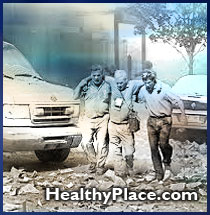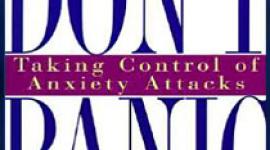Terrorism Fear: What You Can Do To Alleviate It

The causes of terrorism fear and war fear and how to cope with persistent fear of terrorism and war.
 Dr. Cox is President and Medical Director of the National Anxiety Foundation. The word "National" in National Anxiety Foundation refers to the nation of the United States of America. The following medical information is written specifically for the enlightenment of the citizens of the United States of America. However, in the international scope, terrorism affects almost everyone on earth. Citizens of every country may be helped by this information.
Dr. Cox is President and Medical Director of the National Anxiety Foundation. The word "National" in National Anxiety Foundation refers to the nation of the United States of America. The following medical information is written specifically for the enlightenment of the citizens of the United States of America. However, in the international scope, terrorism affects almost everyone on earth. Citizens of every country may be helped by this information.
War and terrorism are powerful causes of fear. A change in behavior caused by fear is the desired effect and the purpose of terrorism. Combating this fear is not just desirable. Combating this fear is the duty of each and every citizen. And helping other citizens to fight this fear is the duty of every citizen. Mitigating your fear and alleviating fear in others is your obligation. But how do you fight fear?
You will notice I am not using the word anxiety here. I use the word fear. Anxiety often refers to the feeling or emotion of fear when the cause of the emotion is sometimes obscure. I don't think the phrases "terrorism anxiety" or "war anxiety" make much sense after September 11, 2001. Terrorism fear and war fear makes a lot of sense to me. People during this time of terrorism are not unclear about where their fear is coming from. They know exactly what they are afraid of and it is not an irrational anxiety.
First, to understand fear more completely, let's consider what the opposite of fear is. A lot of unpleasant emotions have an opposite emotion. Opposites are words like good and bad, up and down, and light and darkness. Some emotions have opposites, like sad and glad. The emotion fear actually has two opposites when one really thinks about it. The two opposites of fear are (1) courage and (2) peace of mind. To eliminate fear, we should replace it somehow with one or both of its opposite emotions - courage or peace of mind.
To change an emotion from one emotion to another, you must change the thoughts that lead to that emotion. That is because, except in the case of a so-called "clinical imbalance psychiatric disorder," our emotions stem from our thoughts. If I think fearful thoughts, guess how I am going to feel emotionally? I am going to feel afraid; but, if I exert effort to force myself to think courageous and brave thoughts, or to think peaceful, calm thoughts, I am going to feel how? I am going to feel more brave or feel more peace of mind.
Every time you feel afraid, it should help to think courageous thoughts or calming thoughts. This is not rocket science. If you have ever had a friend who was frightened and you tried to console them, what did you tell them? You didn't agree with them and tell them that whatever dangerous possibility they were afraid of was certain to occur. No, you tried to reassure them that in your opinion they overestimated the actual risk of harm and the situation was not as dangerous as they told themselves it was.
It can help to identify and write down what fearful thoughts you are thinking. Often, when you write down on paper your actual fearful thought and then read it, you can more easily see that it is untrue or that it is an exaggeration of a very unlikely risk of harm. Once you realize you are thinking an exaggeration, you can more easily change your thought to a less frightening or less exaggerated thought. That less frightening thought will lead to a less frightening emotion. Here are some examples of irrational, fearful thoughts and some improved, truthful, less frightening thoughts.
FLYING
Irrational fear thought:
"I think I'm likely to die from an attack by terrorists if I fly on an airline. I am going to cancel my ski trip" (this thought causes fear).
Braver and calmer, rational alternative thought:
"I refuse to scare myself by allowing myself to predict catastrophes that are going to happen to me. The truth is that I don't have a crystal ball. The truth is that I don't know the future. Something bad might happen to me but that is unlikely. There were about 5000 planes aloft in the United States air space at the moment the Word Trade Center was attacked. In that two-hour period that the World Trade Center was attacked, there were only 4 planes out of about 5000 that were attacked; therefore, about 4,996 planes were not affected. Even on September 11, 2001 at 9:00AM my risk of my plane being hijacked was only 4 chances out of about 5000. So there were 4996 chances out of about 5000 that my plane would have arrived safely even on that morning of 9/11/2001. With the increased security, safeguards and watchfulness, it is probably even much safer to fly today than it was that day. Flying never was guaranteed to be completely safe. Several planes crash every year around the world, but that risk didn't keep me from flying in the past. This terrorism risk adds only a very tiny risk to the overall risk that I previously accepted without giving it much thought" (this sensible thought alleviates fear by leading to a braver and calmer emotion).
ANTHRAX
Fearful, irrational thought:
"I am going to try and talk my family out of going to Florida to visit my aging parents. We will all catch anthrax and die."
Braver and calmer, rational alternative thought:
"I refuse to upset myself by allowing myself to predict that a catastrophe will happen to me and my loved ones. Several million people live in Florida and only a few persons have contracted anthrax in the whole state; and out of all of those, only one or two died. My farmer grandfather once had sheep that contracted anthrax, but nobody panicked about it. It makes no sense to avoid a trip to Florida when last year I went to Central America knowing I could catch drug resistant malaria (which I know is fatal). I refuse to let terrorists win by changing the way I do things. I am going to stop frightening myself about anthrax and go to Florida and live my life the way it is normal and right to do" (These thoughts fight fear by leading to the braver and calmer emotion).
POISON WATER
Irrational fearful thought:
"I am afraid to drink anything. What if terrorists poison the water supply?"
Braver and calmer, rational alternative thought:
"I refuse to scare myself out of drinking water and other beverages because of this irrational exaggerated thinking. Although it's possible that a terrorist might try to poison some reservoir somewhere, it is extremely unlikely. There are thousands of water systems in this country. The odds are slim that terrorists would target the water system in my local area to contaminate. Testing and water treatment would probably eliminate such contamination anyway" (This logical thought fights fear by leading to a braver and calmer emotion.).
MASS GATHERINGS AT PUBLIC EVENTSIrrational fearful thought:"I am not going to the World Series. There might be a terrorist attack." Braver and calmer, rational alternative thought:" I refuse to scare myself out of activities that I enjoy by allowing myself to think scary thoughts that are very unlikely to happen. I am a patriot. I am going to do more than tape up an American flag on my car window. Winston Churchill, during the darkest hours of the German air attack on England, rallied his countrymen with the motto, 'Deserve Victory.' I am going to live my life as normally as possible. I'll do this as a patriot and as a defeat to terrorists who seek to have citizens of my country cower from their usual way of life. By doing this, I will do my part to 'Deserve Victory'." |  |
Survival Tools For Alleviating Terrorism Fear:
Courage
- Fly airlines again
- Travel on business and for pleasure
- Invest in securities
Patriotism
- Enlist in the armed forces
- Fly or display an American flag
- Register to vote (and vote)
- Run for public office
Distraction
- Read a novel
- Engage in a hobby
- Paint the house
- Buy a pet
- Get back to your everyday routines.
"Hope for the best. Be prepared for the worst"
- Have 3 gallons of drinking water per person stored.
- Have food that does not require refrigeration or cooking.
- Have a flashlight and batteries, matches and candles.
- Have some currency cash on hand.
- Have a weeks supply of regularly taken medications.
Decrease stimulus
- Turn off excessive TV news
- Change the topic in conversation from catastrophe, doom and worry
Relaxation
- Exercise
- Go to bed early
- Take a hike in the woods with your family or friends
- Do something that you enjoy like going for a drive, or playing with your dog.
Self-expression
- Put your feelings into words
- Talk to a friend about your fears. Listen to their fears.
- Write a journal to express your thoughts and feelings
Compartmentalize
- Allocate only a reasonable amount of time to each of your stresses
God
- Go to church
- Donate to Charity (church, National Anxiety Foundation, Red Cross, Salvation Army)
- Prayer
Humor
- Listen to a Carl Hurley tape
- Watch a comedian monologue about terrorism
- Read political cartoons
Reason and Logic
- Stop expecting the worst
- Think of how very unlikely harm is to come to you or your loved ones
For Children:
- Tell them that they really are safe.
- Keep to your usual routines.
- Keep them from seeing too many frightening pictures of the events.
- Teach them repeatedly not to play with white powder as a joke or prank. It is not funny. It is illegal. It is disrespectful to their country and their fellow man.
- Teach them to respect all people including Muslims and those appear to be "Persian".
How do I know if I need professional mental health help?
There is no simple way you can be sure about this, but here are some guidelines, any one of which might suggest it to be worthwhile to have an assessment visit with a mental health professional:
- Being an actual, direct victim of terrorism
- Excessive nightmares about terrorism
- Loss of normal emotions toward loved ones
- Feeling numb emotionally
- Unusual change in sleep habits or appetite
- Excessive fatigue
- Loss of interest in usual activities
- Unusual startling to sudden noises
- Excessive crying or guilt feelings.
- Can't go to work
- Drinking alcohol excessively or taking non-prescribed drugs
- Persons who know you intimately think you should get help
What might a mental health professional do to help me?
Most people will not require treatment by a mental health professional. Unfortunately, a few persons who were actual victims of injury or who were there and witnessed the injury of others may suffer from post-traumatic stress disorder (PTSD). PTSD can be treated with talk therapy, medication, or both. Talk therapy is special counseling or psychotherapy. Some of these persons may benefit from a PTSD medication such as Paxil (paroxetine) or fluoxetine. Some persons may require anxiety medications such as alprazolam. Depressed patients may require an antidepressant, for example, Celexa (citalopram), Effexor XR (Venlafaxine), Paxil (paroxetine), Remeron, or Wellbutrin (bupropion).
Seeking help
What kind of health care professional should I see if I want a consultation?
The first step should be to have a medical evaluation to determine the proper diagnosis. Your family physician is the good place to start. Tell him or her what has been happening to you and that you wonder if you might have PTSD, depression or another anxiety disorder. Print this document, circle the items that concern you, and show it to the doctor.
After the evaluation perhaps the doctor will tell you that you do have a disorder. Then what? You may wish to see a psychiatrist.
Psychiatrists are physicians (MD's or DO's). A psychiatrist who is experienced in treating such disorders is perhaps the most qualified single professional to deal with the problem. There is a national shortage of psychiatrists. There may not be one in your area, or your HMO may not allow you to be seen by one of their psychiatrists. In these instances, seeing your regular doctor for medication and consulting a psychologist for cognitive-behavior therapy is good. Psychologists are not physicians (instead of M.D. or D.O., they may have other abbreviations after their name such as Ph.D. or Ed.D. or Psy.D.). If a psychologist isn't available for therapy, a social worker that is familiar with this therapy can be very helpful.
Terrorism is a terrible and evil thing. We all despise those who have inflicted this scourge on today's world. We look forward to days when we all feel a little safer at home and abroad. Until that time there are things we can and must do to help our loved ones our neighbors and ourselves. I hope this information has helped you.
Stephen Michael Cox, M.D.
President / Medical Director
National Anxiety Foundation
Dr. Cox wishes to gratefully acknowledge the helpful assistance of The Center for Post Traumatic Stress Disorder in preparing this work.
next: Worry: How Much is Too Much?
~ anxiety-panic library articles
~ all anxiety disorders articles
APA Reference
Staff, H.
(2001, October 26). Terrorism Fear: What You Can Do To Alleviate It, HealthyPlace. Retrieved
on 2026, March 5 from https://www.healthyplace.com/anxiety-panic/articles/terrorism-fear-what-you-can-do-to-alleviate-it



